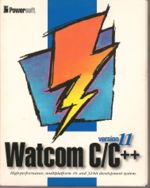Difference between revisions of "Watcom C"
(→11.0) |
m (Minor grammar changes: it's -> its) |
||
| Line 1: | Line 1: | ||
[[Image:Watcom c 11 Front.jpg|150px|thumb|right|Watcom C++ 11]] | [[Image:Watcom c 11 Front.jpg|150px|thumb|right|Watcom C++ 11]] | ||
| − | The Watcom C language and compiler was really popular in the early 1990's because of | + | The Watcom C language and compiler was really popular in the early 1990's because of its optimizations for the Pentium CPU, along with its ability to target [[MS-DOS]], [[Windows 3.1]], [[OS/2]] in both 16bit and 32bit flavors. Watcom C also added the ability to target [[Novell Netware]]. |
Watcom C includes both register & stack calling compilers, which depending on the targeted CPU can yield better results. | Watcom C includes both register & stack calling compilers, which depending on the targeted CPU can yield better results. | ||
| Line 11: | Line 11: | ||
== OpenWatcom == | == OpenWatcom == | ||
| − | Watcom sold all the compiler technology to Sybase where it languashed, then it was swept up by Powersoft. It was then opensourced, and is free to all including | + | Watcom sold all the compiler technology to Sybase where it languashed, then it was swept up by Powersoft. It was then opensourced, and is free to all including its [[FORTRAN]]. |
The current version is 1.9 | The current version is 1.9 | ||
Revision as of 15:12, 29 June 2010
The Watcom C language and compiler was really popular in the early 1990's because of its optimizations for the Pentium CPU, along with its ability to target MS-DOS, Windows 3.1, OS/2 in both 16bit and 32bit flavors. Watcom C also added the ability to target Novell Netware. Watcom C includes both register & stack calling compilers, which depending on the targeted CPU can yield better results.
10.0
This version bundled the popular DOS/4GW dos extender, and was made popular by such games as Doom. Version 10.0 included the Win32 SDK for Win32s & Windows NT 3.1, the Windows 3.1 SDK, and the OS/2 1.3 & 2.0 SDK's for OS/2 development. Additionally it included the MFC libraries.
11.0
This updated the Windows NT support up to 3.5, and Windows 95 levels.
OpenWatcom
Watcom sold all the compiler technology to Sybase where it languashed, then it was swept up by Powersoft. It was then opensourced, and is free to all including its FORTRAN.
The current version is 1.9
